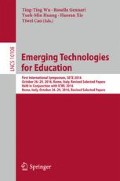Abstract
Peer-assessment in education has a long history. Although the adoption of technological tools is not a recent phenomenon, many peer-assessment studies are conducted in manual environments. Automating peer-assessment tasks improves the efficiency of the practice and provides opportunities for taking advantage of large amounts of student-generated data, which will readily be available in electronic format. Data from three undergraduate-level courses, which utilised an electronic peer-assessment tool were explored in this study in order to investigate the relationship between participation in online peer-assessment tasks and successful course completion. It was found that students with little or no participation in optional peer-assessment activities had very low course completion rates as opposed to those with high participation. In light of this finding, it is argued that electronic peer-assessment can serve as a tool of early intervention. Further advantages of automated peer-assessment are discussed and foreseen extensions of this work are outlined.
Access this chapter
Tax calculation will be finalised at checkout
Purchases are for personal use only
References
Topping, K.: Peer assessment between students in colleges and universities. Rev. Educ. Res. 68(3), 249–276 (1998). doi:10.3102/00346543068003249, URL: http://rer.sagepub.com/content/68/3/249.abstract, http://rer.sagepub.com/content/68/3/249.full.pdf+html
Falchikov N, Goldfinch J (2000) Student peer assessment in higher education: A meta-analysis comparing peer and teacher marks. Review of Educational Research 70(3):287–322, doi:10.3102/00346543070003287, URL http://rer.sagepub.com/content/70/3/287.abstract, http://rer.sagepub.com/content/70/3/287.full.pdf+html
Ashenafi, M.M.: Peer-assessment in higher education twenty-first century practices, challenges and the way forward. Assess. Eval. High. Educ. 1–26 (2015). doi:10.1080/02602938.2015.1100711, URL: http://dx.doi.org/10.1080/02602938.2015.1100711
Ashenafi, M.M., Riccardi, G., Ronchetti, M.: Predicting students’ final exam scores from their course activities. In: Frontiers in Education Conference (FIE), pp. 1–9, 32614 2015. IEEE. doi:10.1109/FIE.2015.7344081
Ashenafi, M.M., Ronchetti, M., Riccardi, G.: Predicting student progress using peer-assessment data. In: 9th International Conference on Educational Data Mining (EDM) (2016)
Luxton-Reilly, A.: A systematic review of tools that support peer assessment. Comput. Sci. Educ. 19(4), 209–232 (2009). doi:10.1080/08993400903384844, URL: http://dx.doi.org/10.1080/08993400903384844, http://dx.doi.org/10.1080/08993400903384844
de Raadt, M., Lai, D., Watson, R.: An evaluation of electronic individual peer assessment in an introductory programming course. In: Proceedings of the Seventh Baltic Sea Conference on Computing Education Research (Koli Calling 2007), vol. 88, pp. 53–64. Australian Computer Society, Inc., Darlinghurst, Australia (2007). URL: http://dl.acm.org/citation.cfm?id=2449323.2449330
Denny, P., Hamer, J., Luxton-Reilly, A., Purchase, H.: Peerwise: Students sharing their multiple choice questions. In: Proceedings of the Fourth International Workshop on Computing Education Research (ICER 2008), pp. 51–58. ACM, New York (2008). doi:10.1145/1404520.1404526, URL: http://doi.acm.org/10.1145/1404520.1404526
Paré, D., Joordens, S.: Peering into large lectures: examining peer and expert mark agreement using peerscholar, an online peer assessment tool. J. Comput. Assist. Learn. 24(6), 526–540 (2008). doi:10.1111/j.1365-2729.2008.00290.x, URL: http://dx.doi.org/10.1111/j.1365-2729.2008.00290.x
Fagen, A.P., Crouch, C.H., Mazur, E.: Peer instruction: results from a range of classrooms. Phys. Teach. 40(4), 206–209 (2002). doi:http://dx.doi.org/10.1119/1.1474140, URL: http://scitation.aip.org/content/aapt/journal/tpt/40/4/10.1119/1.1474140
Simon, B., Kohanfars, M., Lee, J., Tamayo, K., Cutts, Q.: Experience report: peer instruction in introductory computing. In: Proceedings of the 41st ACM Technical Symposium on Computer Science Education (SIGCSE 2010), pp. 341–345. ACM, New York (2010). doi:10.1145/1734263.1734381, URL: http://doi.acm.org/10.1145/1734263.1734381
Kennedy, G.E., Cutts, Q.: The association between students’ use of an electronic voting system and their learning outcomes. J. Comput. Assist. Learn. 21(4), 260–268 (2005). doi:10.1111/j.1365-2729.2005.00133.x, URL: http://dx.doi.org/10.1111/j.1365-2729.2005.00133.x
Yadav, R.K., Gehringer, E.F.: Automated met reviewing: a classifier approach to assess the quality of reviews. In: Computer-Supported Peer Review in Education (CSPRED-2016) (2016)
Wang, Y., Wang, H., Schunn, C., Baehr, E.: Choosing a better moment to assign reviewers in peer assessment: the earlier the better, or the later the better? In: Computer-Supported Peer Review in Education (CSPRED-2016) (2016)
Morris, J., Kidd, J.: Teaching students to give and to receive: improving interdisciplinary writing through peer review. In: Computer-Supported Peer Review in Education (CSPRED-2016) (2016)
Song, Y., Gehringer, E.F., Morris, J., Kid, J., Ringleb, S.: Toward better training in peer assessment: does calibration help? In: Computer-Supported Peer Review in Education (CSPRED-2016) (2016)
Gehringer, E.F.: A survey of methods for improving review quality. In: Cao, Y., Väljataga, T., Tang, Jeff, K.,T., Leung, H., Laanpere, M. (eds.) ICWL 2014. LNCS, vol. 8699, pp. 92–97. Springer, Heidelberg (2014). doi:10.1007/978-3-319-13296-9_10
Babik, D., Gehringer, E.F., Kidd, J., Pramudianto, F., Tinapple, D.: Probing the landscape: Toward a systematic taxonomy of online peer assessment systems in education. In: Computer-Supported Peer Review in Education (CSPRED-2016) (2016)
Author information
Authors and Affiliations
Corresponding author
Editor information
Editors and Affiliations
Rights and permissions
Copyright information
© 2017 Springer International Publishing AG
About this paper
Cite this paper
Ashenafi, M.M., Ronchetti, M., Riccardi, G. (2017). Exploring the Role of Online Peer-Assessment as a Tool of Early Intervention. In: Wu, TT., Gennari, R., Huang, YM., Xie, H., Cao, Y. (eds) Emerging Technologies for Education. SETE 2016. Lecture Notes in Computer Science(), vol 10108. Springer, Cham. https://doi.org/10.1007/978-3-319-52836-6_67
Download citation
DOI: https://doi.org/10.1007/978-3-319-52836-6_67
Published:
Publisher Name: Springer, Cham
Print ISBN: 978-3-319-52835-9
Online ISBN: 978-3-319-52836-6
eBook Packages: Computer ScienceComputer Science (R0)

